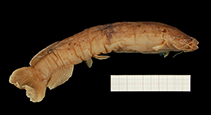| Family: |
Malapteruridae (Electric catfishes) |
| Max. size: |
16.91 cm SL (male/unsexed) |
| Environment: |
demersal; freshwater |
| Distribution: |
Africa: middle Congo River system and the Kumbinanimi River system just north of the Congo River mouth (Ref. 44050, 78218). |
| Diagnosis: |
Anal spines: 0; Anal soft rays: 8-12; Vertebrae: 37-41. Diagnosis: lateral line short, rarely longer than 28% SL, most commonly 18-22% SL; nearly always 6 pelvic-fin rays; generally 2 sensory pores between inner mental barbels; caudal saddle and bar pattern absent; no sharply defined pectoral fin markings (Ref. 44050).
Description: 16-28 abdominal vertebrae; 21-23 caudal vertebrae; 18 caudal-fin rays (arrangement ii-7-7-ii) (Ref. 44050).
Coloration: body and head bicolored; dorsum and flank brown or grey, venter tan; dorsum and flank well-marked with fine spots and larger blotches (up to 5-6 times an eye diameter), with few if any spots on venter; pectoral and pelvic fins light brown or grey in adults; anal fin opaque (whitish) with a dusky patch covering posterior half or third of fin and pale distal margin; caudal fin light brown or grey (close to flank color) with pale distal margin and pale basal crescent; juveniles colored as adults with no hint of caudal saddle and bar pattern (Ref. 44050). |
| Biology: |
|
| IUCN Red List Status: |
Least Concern (LC); Date assessed: 16 February 2009 Ref. (130435)
|
| Threat to humans: |
harmless |
Source and more info: www.fishbase.org. For personal, classroom, and other internal use only. Not for publication.
